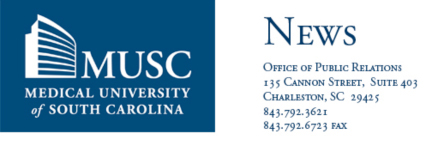
June 3, 2009
Dr. Sunil Patel sometimes slips into the present tense when he talks about Jerry Zucker, who died of glioblastoma in 2008 after almost two years under Patel’s care. Like someone who still feels the presence of an old friend or mentor.
"I always look at treating patients as a God-given privilege," says Patel, clinical chair of the Department of Neurosciences. "But caring for Jerry was an extraordinary experience that changed my life in many ways. In my mind, it confirmed what I needed to do in neurosciences."
Jerry Zucker was a scientist, inventor and businessman who founded The InterTech Group, a Charleston-based polymers conglomerate that grew into one of the nation's largest privately held businesses. In 2006, he made international headlines when he acquired the Hudson's Bay Company of Canada, North America's oldest company. The two first met in 2006. Zucker called Patel to learn more about what might be done to help a family member in Atlanta who had suffered a serious spinal cord injury. It was clear to Patel from the outset that Zucker wasn’t the typical concerned family member.
"By the time I met him, he had already become quite knowledgeable about spinal cord injuries," said Patel. "He had read probably 200 to 300 recent papers and scoured the world, talking to people in Israel and China about the latest research. I was amazed that someone from the business world had acquired so much medical knowledge so quickly."
A year later, Zucker was diagnosed with a brain tumor, and Patel became his physician. They met frequently and spoke on the phone about his disease, often late into the night.
"Jerry was very frustrated with health care. He saw a lot of dollars going into research but very little coming out, at least at a pace that satisfied him," said Patel. "It’s important to understand, this was a man who spent much of his life taking scientific discoveries and applying them very quickly to improve lives, to do business, to improve the world. He wanted results."
The two talked at length about the need for a stronger link between research and patient care.
"In medicine, we call this translational research – translating research into new treatments," says Patel. "But Jerry was a mathematician, and in mathematics, translation means something different. To him, translation was simply moving a figure from one place to another. Transformation, on the other hand, meant expanding that figure and growing it into something different. Jerry said that research in medicine needed to be more transformational."
Zucker passed away on April 12, 2008. Shortly afterward his wife, Anita, began meeting with Patel to talk about a way they might bring Zucker’s vision of "transformational research" to life in the Medical University’s Department of Neurosciences.
"We knew we wanted Jerry to be memorialized at MUSC. He had a huge interest in science, especially the neurosciences, and I think he would have been incredibly pleased by the idea of helping people’s brains function better," said Mrs. Zucker, who currently serves as chairwoman of the MUSC Foundation’s Board of Directors. "But beyond that, the caregivers did such a great job here, not just for Jerry but for me and our entire family. If it weren’t for them, I don’t know where I’d be."
After several months of planning, Mrs. Zucker and her family made a gift of $2 million that will set the stage for aggressive research into new treatments for brain tumors, spinal cord injuries and other neurological ailments. The bulk of the Zuckers’ gift will be used to explore brain tumors. Specifically, it will fund an investigation of new tumor-fighting drugs and establish a new endowed chair: The Jerry Zucker Endowed Chair in Brain Tumor Research. The gift also will support spinal cord research and allow MUSC surgeons to bring neurosurgical care and neurosurgical training to the people of Tanzania, Africa, where there currently are only three neurosurgeons in the country, a ratio of one to every 12.9 million people.
Finally, the Zuckers’ gift will allow Patel and his team to begin planning a comprehensive Neuroscience Center at MUSC, a center rooted in Jerry Zucker’s desire to build seamless linkages between research and new innovations in patient care.
"Sunil is trying to create a single location where people involved in patient care, research and business can come together and focus on one thing: how to heal the brain and central nervous system," said Mrs. Zucker. "We wanted to help him lay the groundwork for this center."
For his part, Dr. Patel sees the Zuckers’ contribution not as a gift, but as an investment in a cure for diseases such as glioblastoma.
"I take it as a responsibility," he said. "I told Mrs. Zucker,’I thank you, but this means a lot of work.’ And it’s a lot of work because I know what Jerry’s expectations would be, and they’d be very, very high."
About MUSC
Founded in 1824 in Charleston, The Medical University of South Carolina is the oldest medical school in the South. Today, MUSC continues the tradition of excellence in education, research, and patient care. MUSC educates and trains more than 3,000 students and residents, and has nearly 11,000 employees, including 1,500 faculty members. As the largest non-federal employer in Charleston, the university and its affiliates have collective annual budgets in excess of $1.6 billion. MUSC operates a 750-bed medical center, which includes a nationally recognized Children's Hospital and a leading Institute of Psychiatry. For more information on academic information or clinical services, visit www.musc.edu or www.muschealth.com.
#####